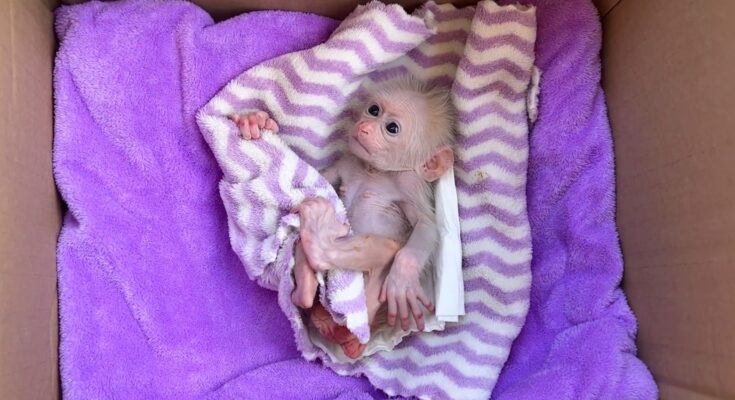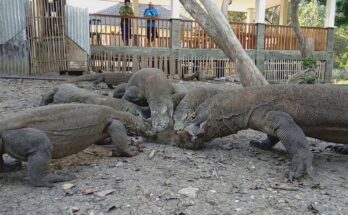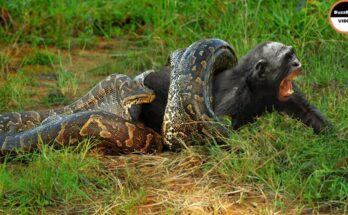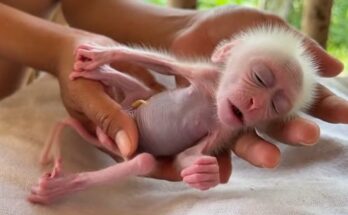Monkeys are fascinating creatures known for their playful behavior and intelligence. Their adorable faces and curious nature can be irresistible, leading some people to consider raising them as pets. But is it a good idea to feed a baby monkey in your family? Let’s explore the pros and cons to help you make an informed decision.
The Reality of Feeding a Baby Monkey
Feeding a baby monkey might sound like a fun and loving experience, but it comes with significant responsibilities and challenges. Unlike cats or dogs, monkeys have unique dietary needs that require careful attention and consistency.
- Nutritional Needs
Baby monkeys need a specialized diet that mimics what they would eat in the wild. This includes a balance of fruits, vegetables, insects, and sometimes milk formulated specifically for primates. Feeding them human food can lead to nutritional deficiencies and health issues. - Health Risks
Monkeys can carry zoonotic diseases, which can be transmitted to humans. Close contact while feeding increases the risk of illness for both the monkey and the family members. - Behavioral Issues
Monkeys are wild animals by nature. Feeding them can strengthen their dependency on humans, which may lead to behavioral issues as they grow older, including aggression and territorial behavior.
Emotional Attachment and Ethical Considerations
Raising and feeding a baby monkey may create a strong emotional bond, but it’s essential to consider the ethical implications. Monkeys are highly social animals that thrive in the company of their own kind. Is it fair to separate them from their natural habitat and social groups?
- Social Development
Monkeys learn vital social skills from their families and troop members. By feeding and raising them in a human environment, they miss out on critical interactions needed for healthy development. - Long-Term Commitment
Monkeys live for decades, and feeding them as babies is only the beginning. As they grow, their dietary needs change, and the financial and time investment can become overwhelming.
Alternatives to Feeding a Baby Monkey
If you’re fascinated by monkeys but unsure about the responsibility of feeding one, consider these alternatives:
- Volunteer at a Wildlife Sanctuary: Experience feeding and caring for monkeys in a safe, controlled environment.
- Adopt a Monkey Virtually: Many organizations allow you to sponsor a monkey’s care without taking them home.
- Observe in Their Natural Habitat: Support eco-tourism and watch monkeys in the wild, where they belong.
Conclusion: Should You Feed a Baby Monkey?
While the idea of feeding a baby monkey may be appealing, it’s crucial to consider the long-term implications and challenges. Monkeys are wild animals with complex needs, and feeding them at home can do more harm than good. If you truly love these incredible creatures, supporting conservation efforts and observing them in the wild is a more ethical and responsible choice.
Can You Feed a Baby Monkey in the USA and Outside the USA?
Monkeys are undeniably charming and captivating creatures, leading some people to consider them as pets. But can you legally feed a baby monkey in the USA and other countries? The answer depends on a variety of legal, ethical, and practical considerations. Let’s explore the rules and regulations, as well as the cultural aspects of feeding baby monkeys in different parts of the world.
Feeding Baby Monkeys in the USA
In the United States, laws regarding feeding and keeping baby monkeys as pets vary significantly from state to state. Some states have strict regulations, while others allow it with certain permits.
- States Where Feeding and Owning Baby Monkeys is Allowed
In states like Nevada, North Carolina, and Alabama, owning and feeding a baby monkey is legal without a permit. However, even in these states, there are recommended guidelines to ensure the monkey’s health and safety. - States with Strict Regulations
States like California, New York, and Hawaii have outright bans on keeping monkeys as pets, which includes feeding them at home. In these states, only licensed zoos, research facilities, or wildlife sanctuaries can care for monkeys. - Federal Regulations
The USDA (United States Department of Agriculture) regulates the importation and care of primates under the Animal Welfare Act. Feeding a baby monkey requires compliance with specific health and safety standards.
Feeding Baby Monkeys Outside the USA
Laws about feeding and keeping baby monkeys vary widely outside the USA, depending on cultural norms and wildlife protection laws.
- Europe
In most European countries, including the UK, it is illegal to keep primates as pets, which includes feeding them at home. Strict regulations are in place to protect the welfare of monkeys and to prevent illegal wildlife trade. - Asia
In countries like Thailand and Indonesia, monkeys are commonly seen in markets and tourist attractions. However, feeding them is heavily regulated to avoid health issues and aggressive behavior. In some regions, it’s culturally accepted, but wildlife protection laws are becoming more stringent. - Africa
In African countries, where many monkey species are native, feeding baby monkeys is generally restricted to wildlife reserves and rehabilitation centers. Feeding them in private homes is discouraged to preserve their natural behaviors. - South America
In countries like Brazil, where monkeys are native, feeding them in the wild is discouraged as it can disrupt their natural diet and behavior. Ownership is strictly regulated, and feeding them at home is typically illegal.
Ethical and Environmental Considerations
Regardless of the legal status, feeding baby monkeys raises ethical concerns and environmental implications:
- Impact on Natural Behavior: Feeding monkeys outside their natural environment can alter their instincts and social interactions.
- Contribution to Illegal Trade: In some countries, the demand for baby monkeys as pets fuels illegal wildlife trade, posing a threat to endangered species.
- Health Risks: Monkeys can carry zoonotic diseases, which can be transmitted to humans during feeding and close contact.
Should You Feed a Baby Monkey?
Feeding a baby monkey, whether in the USA or abroad, requires careful consideration of the legal, ethical, and health implications. Before making any decisions, check local laws, consult wildlife experts, and consider the long-term impact on the monkey’s well-being.
If you’re passionate about monkeys, consider alternative ways to support them:
- Volunteer at Wildlife Sanctuaries: Experience feeding and caring for monkeys in a safe, ethical environment.
- Support Conservation Efforts: Contribute to organizations dedicated to protecting monkeys in their natural habitats.
- Observe Responsibly: If traveling abroad, choose eco-tourism options that promote responsible wildlife viewing without direct interaction.
Conclusion: Can You Feed a Baby Monkey?
Legally, feeding a baby monkey is possible in some regions but heavily restricted or prohibited in others. Ethically, it’s essential to prioritize the monkey’s natural needs and welfare. By understanding the regulations and making responsible choices, you can appreciate and support these incredible creatures without causing harm.



